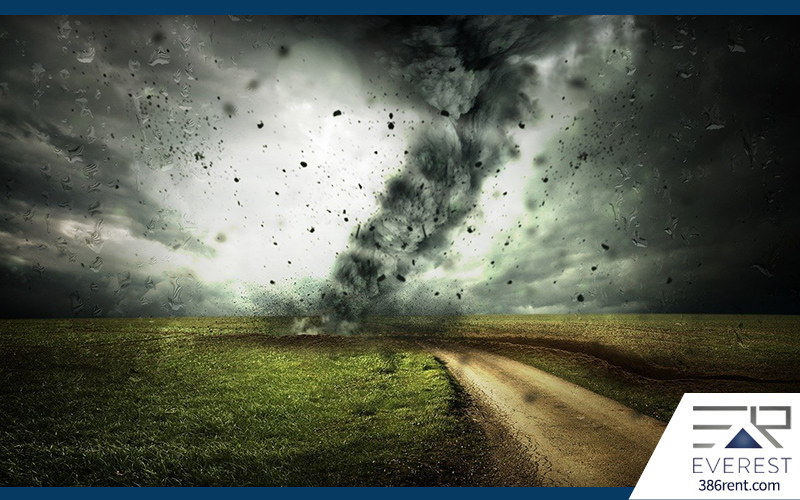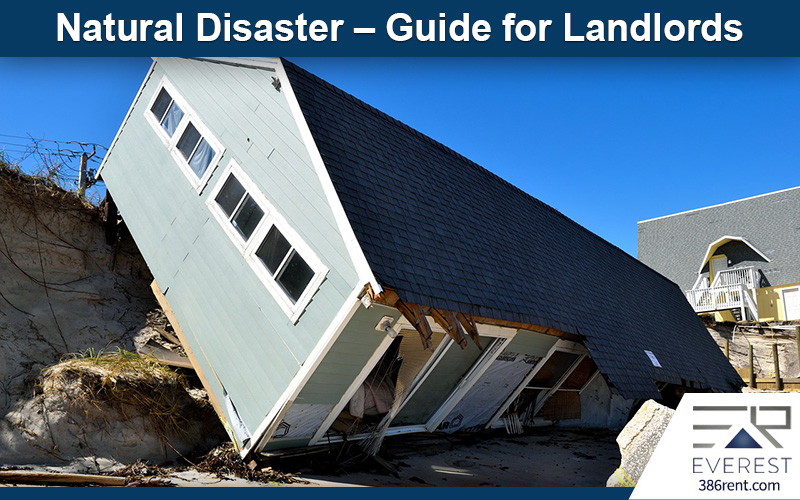Natural disasters are no one's friends; they are as ruthless for tenants as they are for the landlord. They cause billions of dollars of damage every year, however, as a landlord, you can take certain precautions to limit the damage. The financial, as well as the emotional toll of a natural disaster, is the hardest thing. Still, with a proper communication channel, you cannot only limit the damage but also help the tenant cope. Here's a guideline to help understand natural disasters more and also cope better.
Natural Disasters:
All the natural disasters are classified in four different categories.
- Meteorological: Weather-related
- Geological: Related to Earth
- Hydro-logical: Related to Water
Meteorological:
These include tornadoes, droughts, blizzards, as well as wildfires. These disasters have the potential to impact significantly. They also affect huge areas and populations before dying down.
Geological:
These include earthquakes, landslides, sinkholes, as well as volcanic eruptions. They are most common on the West side of the US, in popular areas like Alaska, Hawaii.
Hydro-logical:
These include hurricanes, tsunamis, as well as floods; these are most common along the coastline.
These natural disasters are managed by the American Red Cross and local medical centers. The following are the tips that are commonly followed in case of any natural disaster.
- Survival kit with non-perishable food, water and flashlight.
- Effective emergency and exit plan
- Have hourly updates from local news as well as weather channels
Landlords should be active, vigilant as well as knowledgeable regarding all types of natural disasters. Apart from having survival kits, the landlords should also have an active hand in keeping the property as well as their tenants. It's their responsibility to keep their family, tenants and important documents safe.
Ways to prepare for a Natural Disaster:

Proactive and Efficient:
Being proactive and vigilant is how one can decrease the risk of natural disaster damage. Fortunately, we will in a time and era where information is widespread, and we get to know about any kind of natural disaster beforehand. Here are some tips you can follow in case of a natural disaster.
Natural Disaster Clauses in the Lease Agreement:
The first thing all landlords should do is to amend their lease agreements and add a natural disaster clause if they haven't got any stated. The clause will help tenants understand their role in case of a natural disaster; it will also help them understand the role of the landlord.
The landlord should have an open communication channel with the tenants so that they can actively discuss the emergency plans in case of a warning regarding natural disasters. This planning and taking responsibility make the relationship between the landlord and tenant strong.
Apart from that, regardless of a warning, the landlord should be responsible and should have a maintained property. That way, this property will be able to bear the damages of the natural disaster.
Renter's Insurance:
A landlord has the right to ask their tenants to get a renter's insurance policy. Such a policy covers their property as well as personal injury and also the relocation support. In areas that get most affected by a natural disaster, such a practice should be common.
Emergency Plan as well as Emergency Kit: Being proactive never hurts anyone. Hence landlords should help the tenants prepare an emergency kit as well as an emergency plan. If as a landlord, you have open communication and a cordial relationship with your tenant, this job will take no time. Educate how tenants can risk the damage to their property as well as personal belongings in case of theft, natural disaster as well as a break-in.
Some tips to limit risks and damage may include:
- Take pictures of valuables as well as identify replacement costs
- Ensure that all valuables, as well as documents, are in a fire-proof safe
- Plan a proper evacuation
- Stay updated to all community warnings
Know You Are A Team:
Understand that you, the landlord and the tenant, are a team against the natural disaster. If you act together and have an open communication system, you will be able to fight the disaster better. Here are examples of how you can prepare for a disaster as a team.
Earthquake: In case of an earthquake, you rarely get a warning. However, locate all the gas switches of your home and understand how to shut them off in case of an emergency. This is both the responsibility of the landlord as well as the tenant. After the earthquake any kind of foundation and repair issues are the responsibility of the landlord, the tenant will not be held accountable for it. If you are in a frequent earthquake zone, you will need to secure all objects in the home, as well on the deck and in the lawn, and this is the responsibility of the tenant.
Hurricane: Before a hurricane, the weather department always gives a warning. You may even get a warning a week ahead, so in such a case, there is a lot you can do to limit the risk of injury and accidents. Get branches and trees around the house trimmed or cut down, and this is the responsibility of the landlord. As far as cleaning the gutters, cleaning the drains and all kinds of debris around the house, it's the responsibility of the tenant as well as the landlord.
Any loose object such as lights, BBQ grills, lights and chairs should go in the house or secured down; this is the responsibility of the tenants. Also, windows should be secured shut and covered from the outside, so that there is less damage to them.
Tornado:
Tornado's are brutal, in case of a tornado the warning alert goes off a couple of days before it is to arrive in the town. So, create a safe room, or a cellar, pack it with all you will need for the time you will be down there. Flashlights, cell phones, non-perishable food, candles and emergency kit should all be down there. This both the responsibility of the tenants as well as the landlord. If your area is prone to have tornado's as a regular occurrence, you must have a safe area or a cellar in your home.
If you’d like to talk more about property management, or you need help with Everest Property Management, please contact us at Everest Realty.




 As a top producing Realtor and Property Manager; Terry specializes in sales, extensive construction homes, rentals, REO’s, short sales, and all aspects of Real Estate. After graduating the University of Michigan with a master in MBA, Terry continued his endeavor and now has over 15+ years of experience in the Real Estate world. If there is anything that has to do with Real Estate and sales, you can always be sure of Terry to provide important, specialized knowledge.
As a top producing Realtor and Property Manager; Terry specializes in sales, extensive construction homes, rentals, REO’s, short sales, and all aspects of Real Estate. After graduating the University of Michigan with a master in MBA, Terry continued his endeavor and now has over 15+ years of experience in the Real Estate world. If there is anything that has to do with Real Estate and sales, you can always be sure of Terry to provide important, specialized knowledge.




